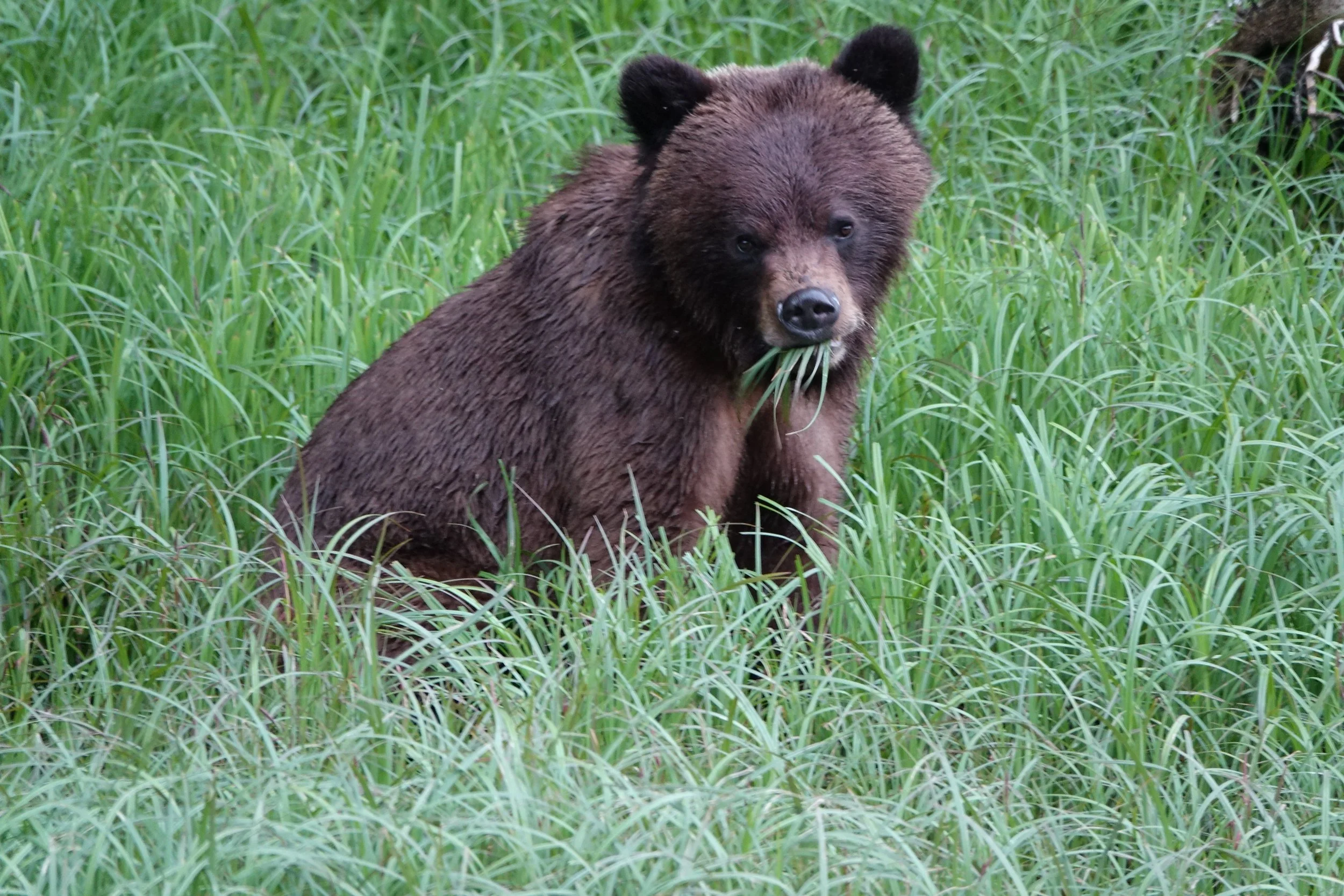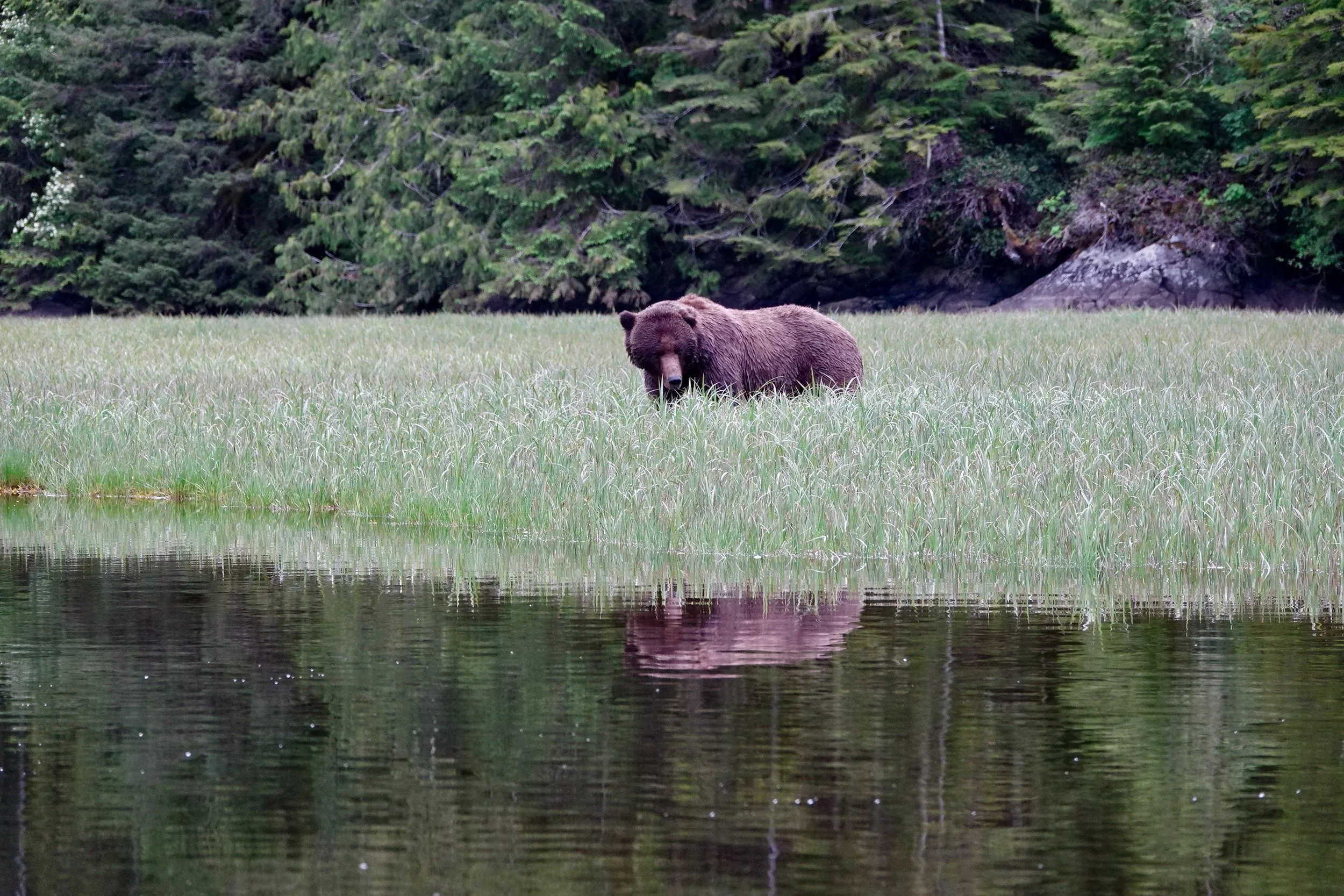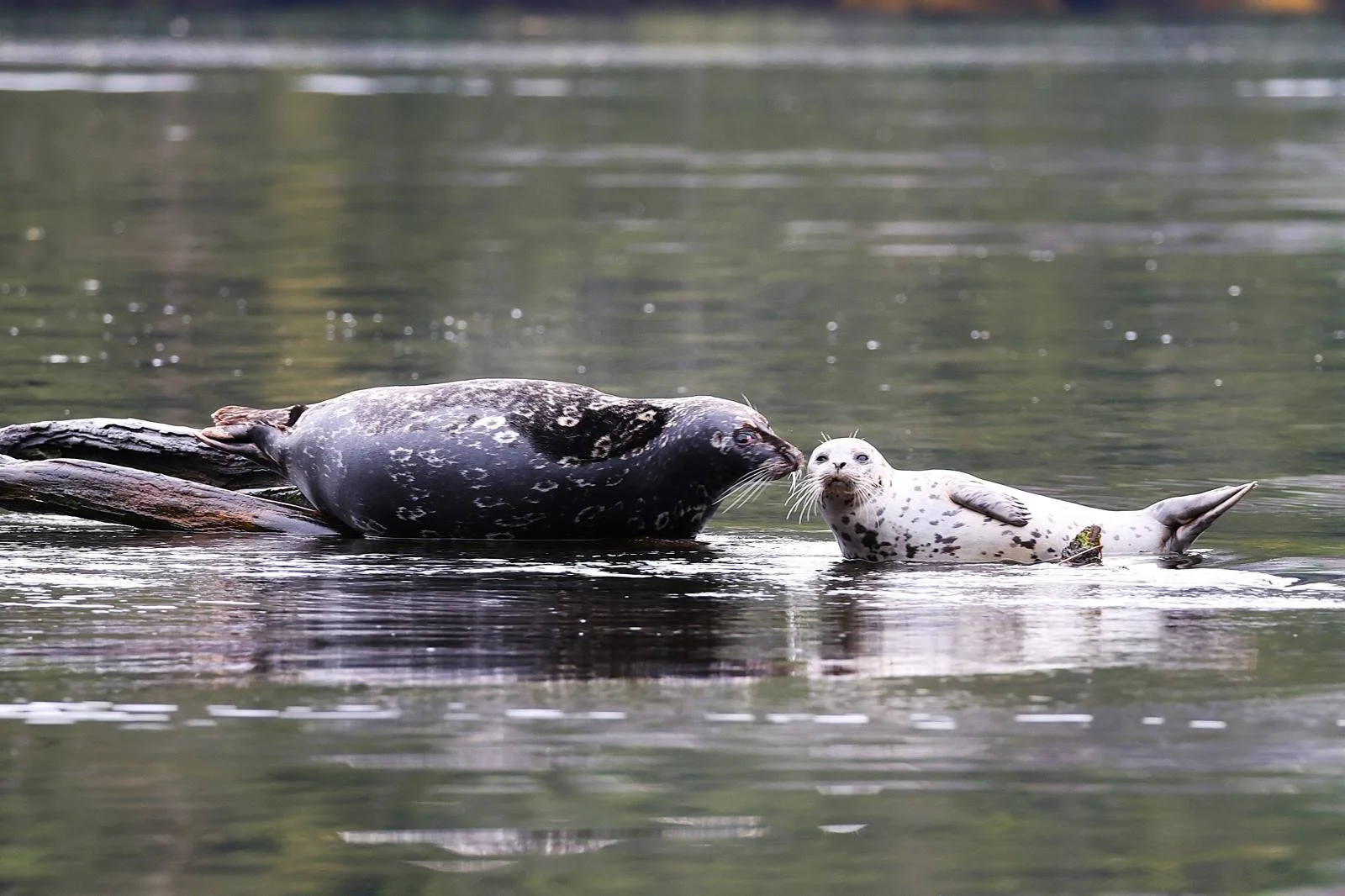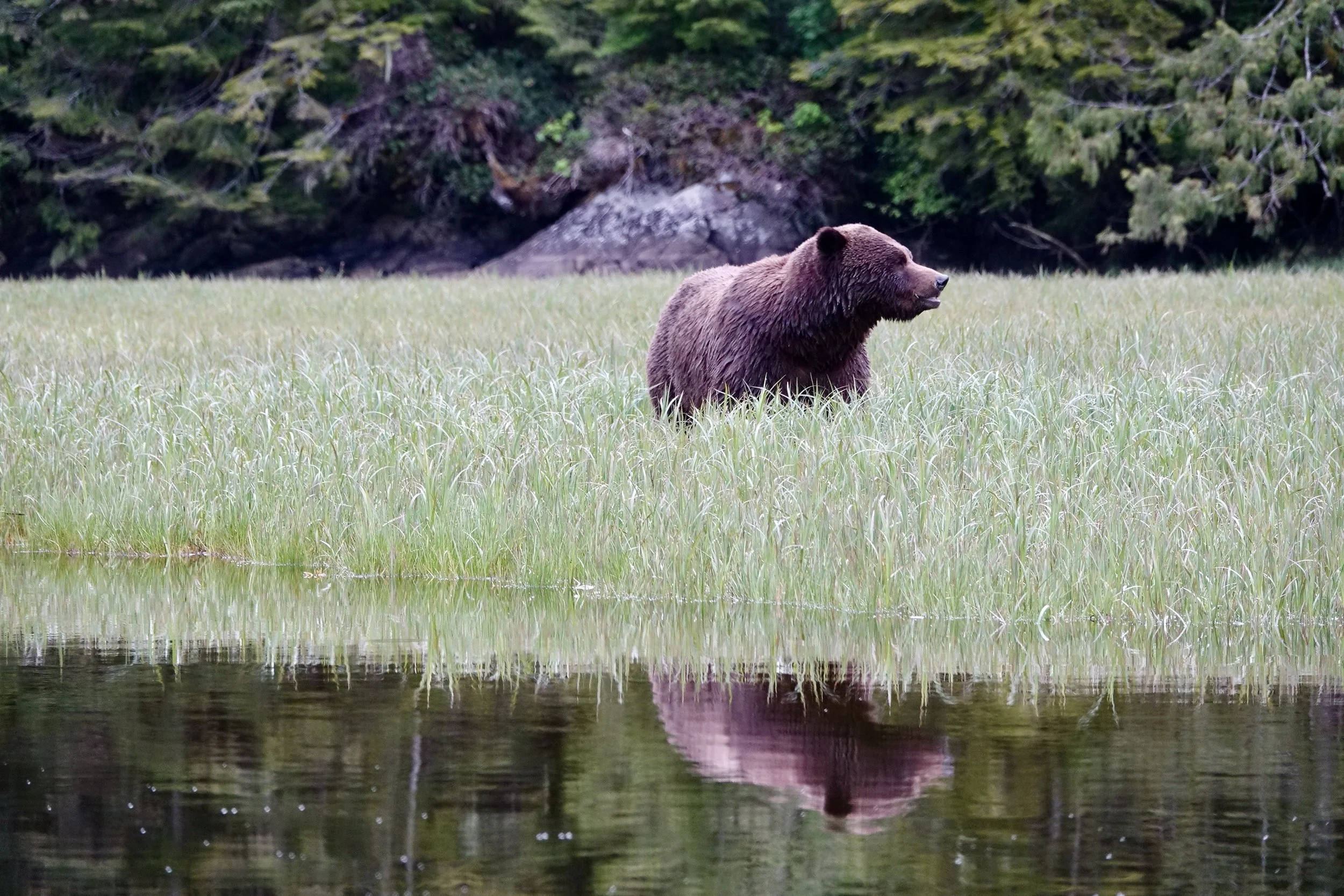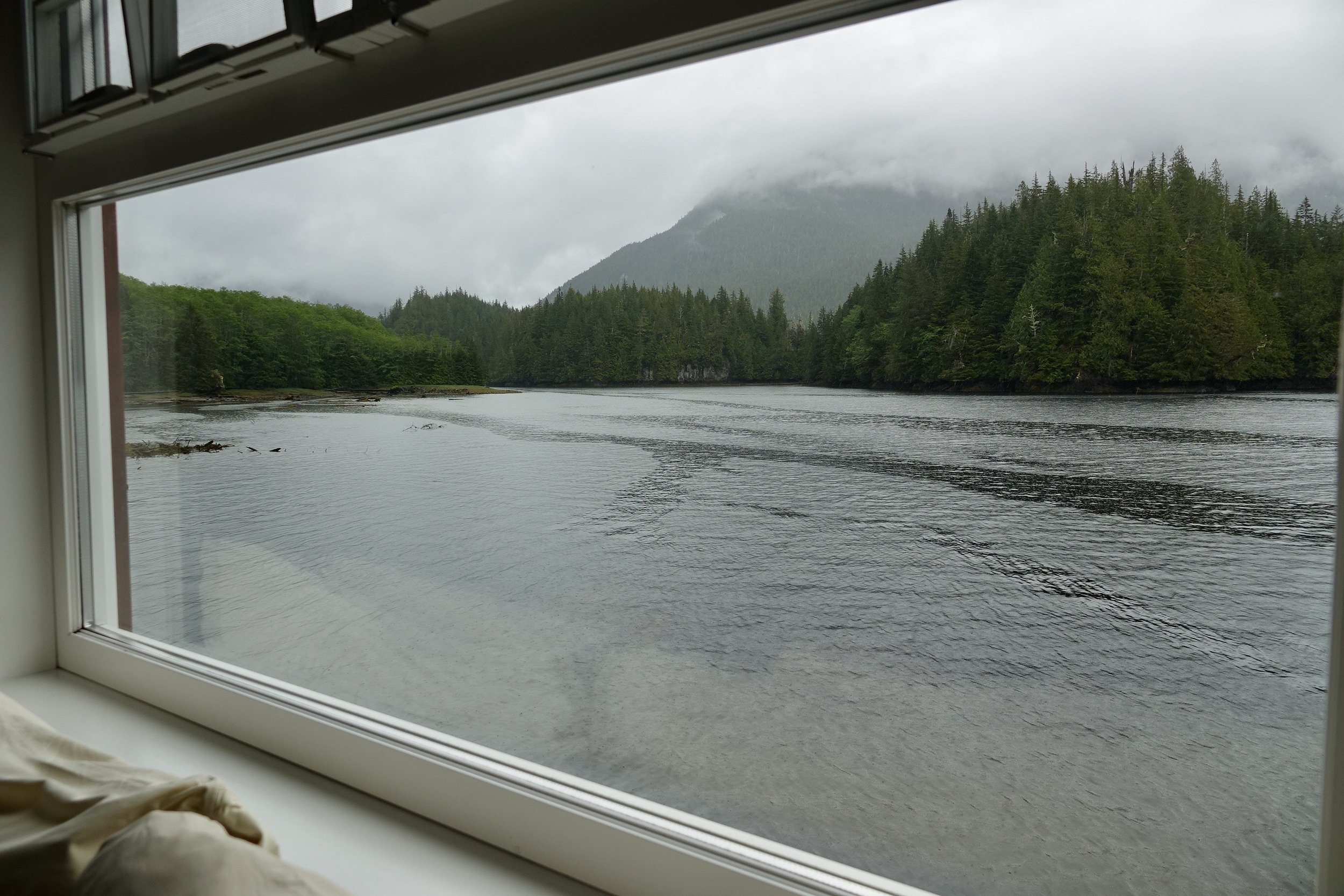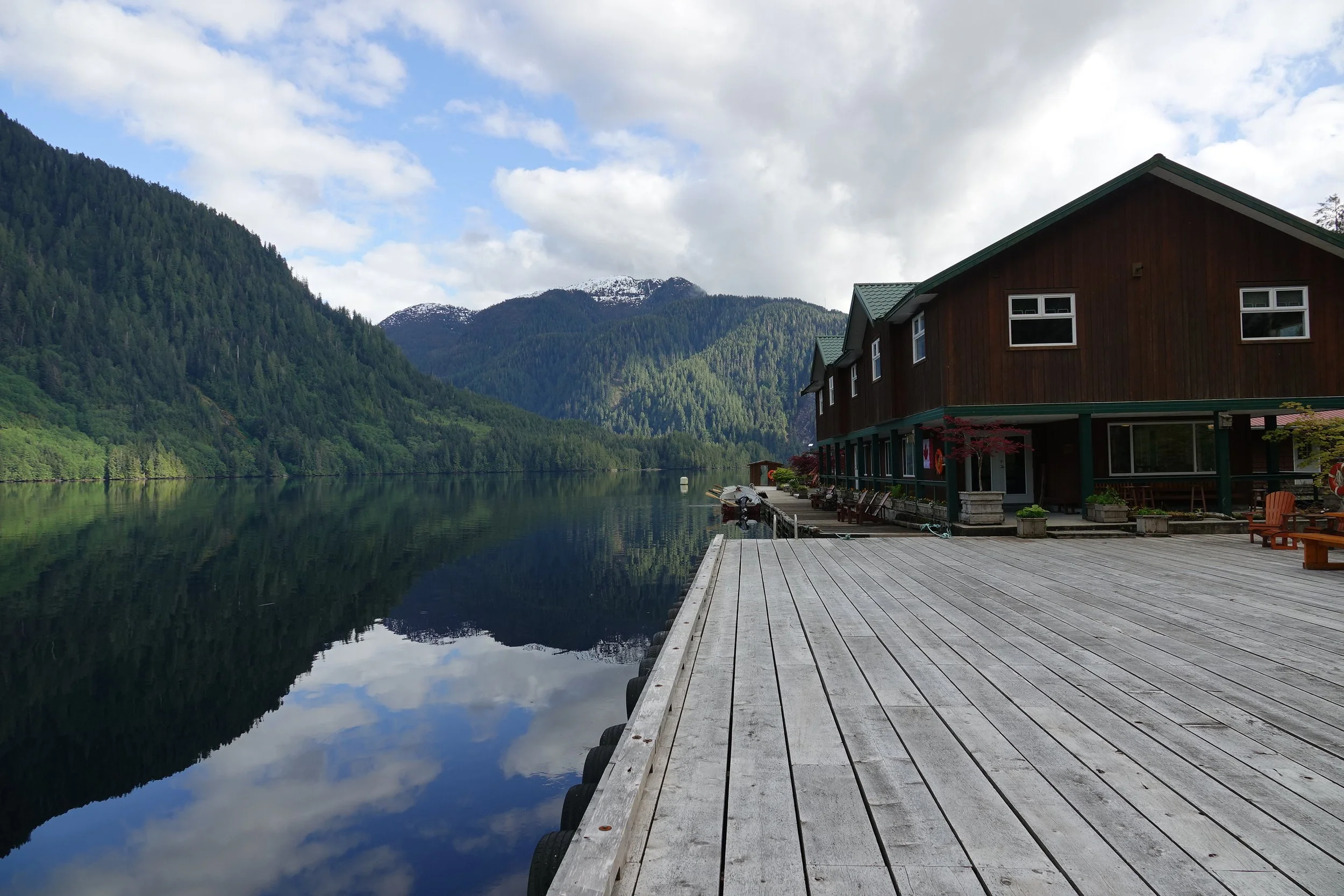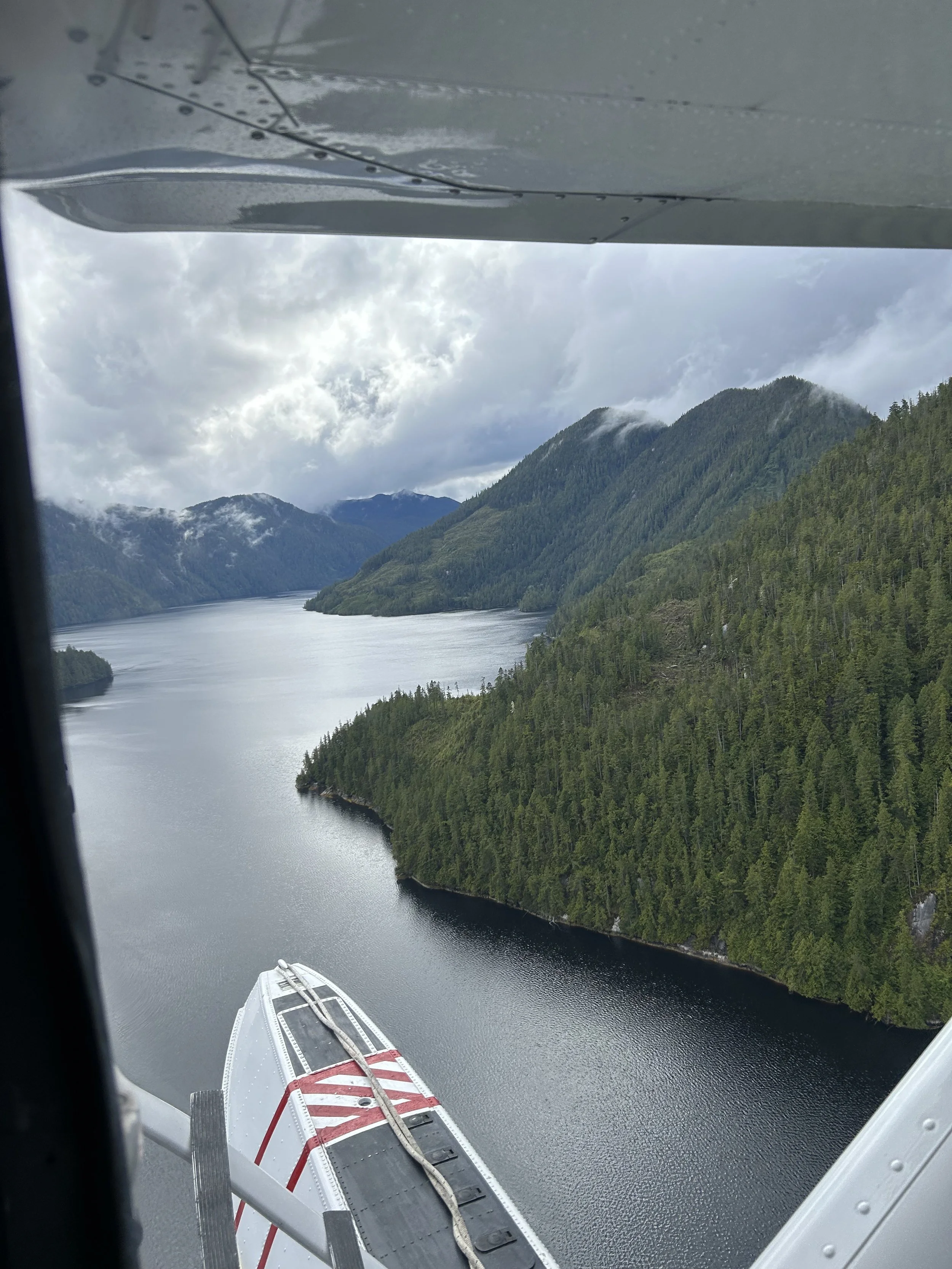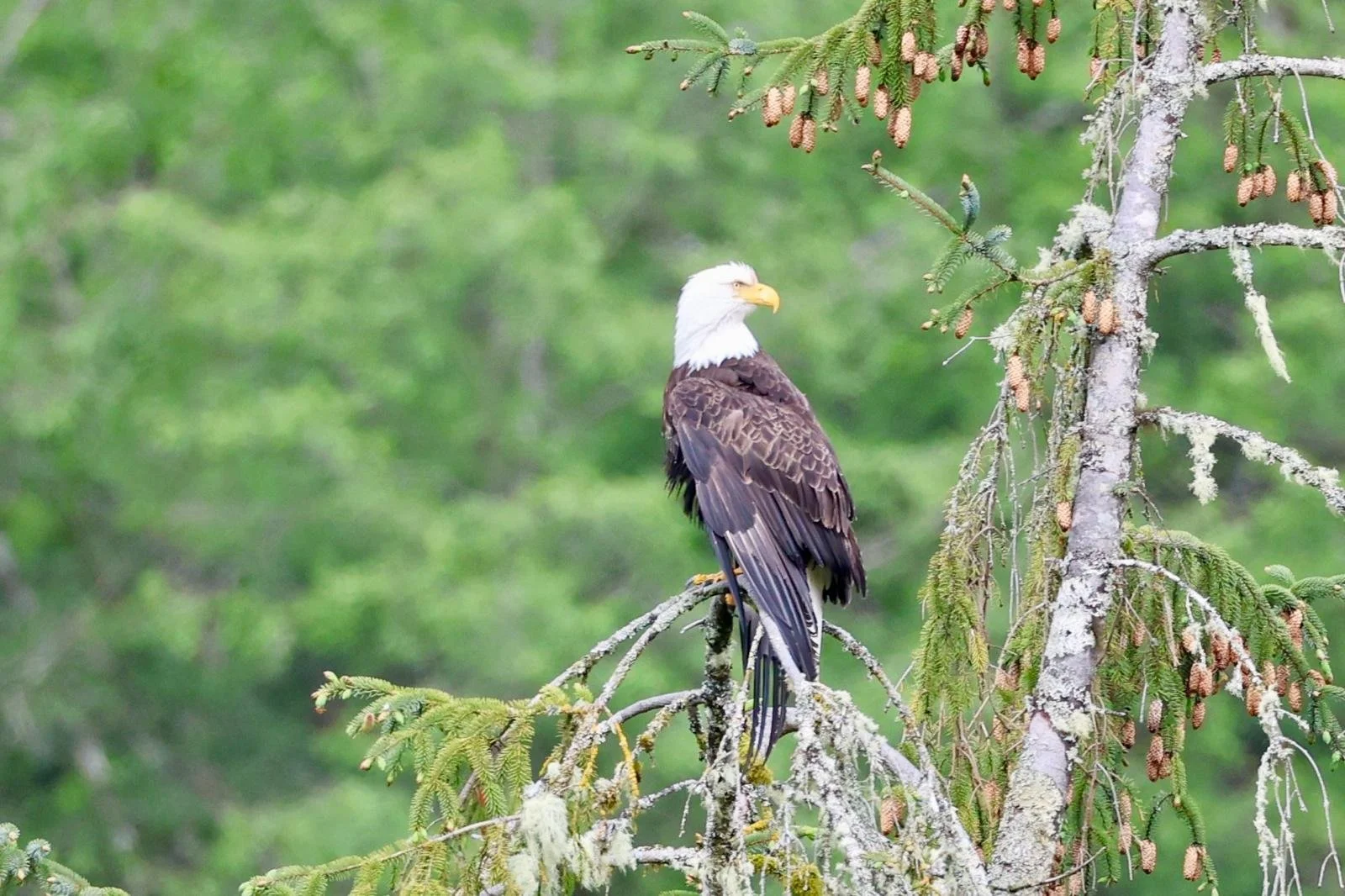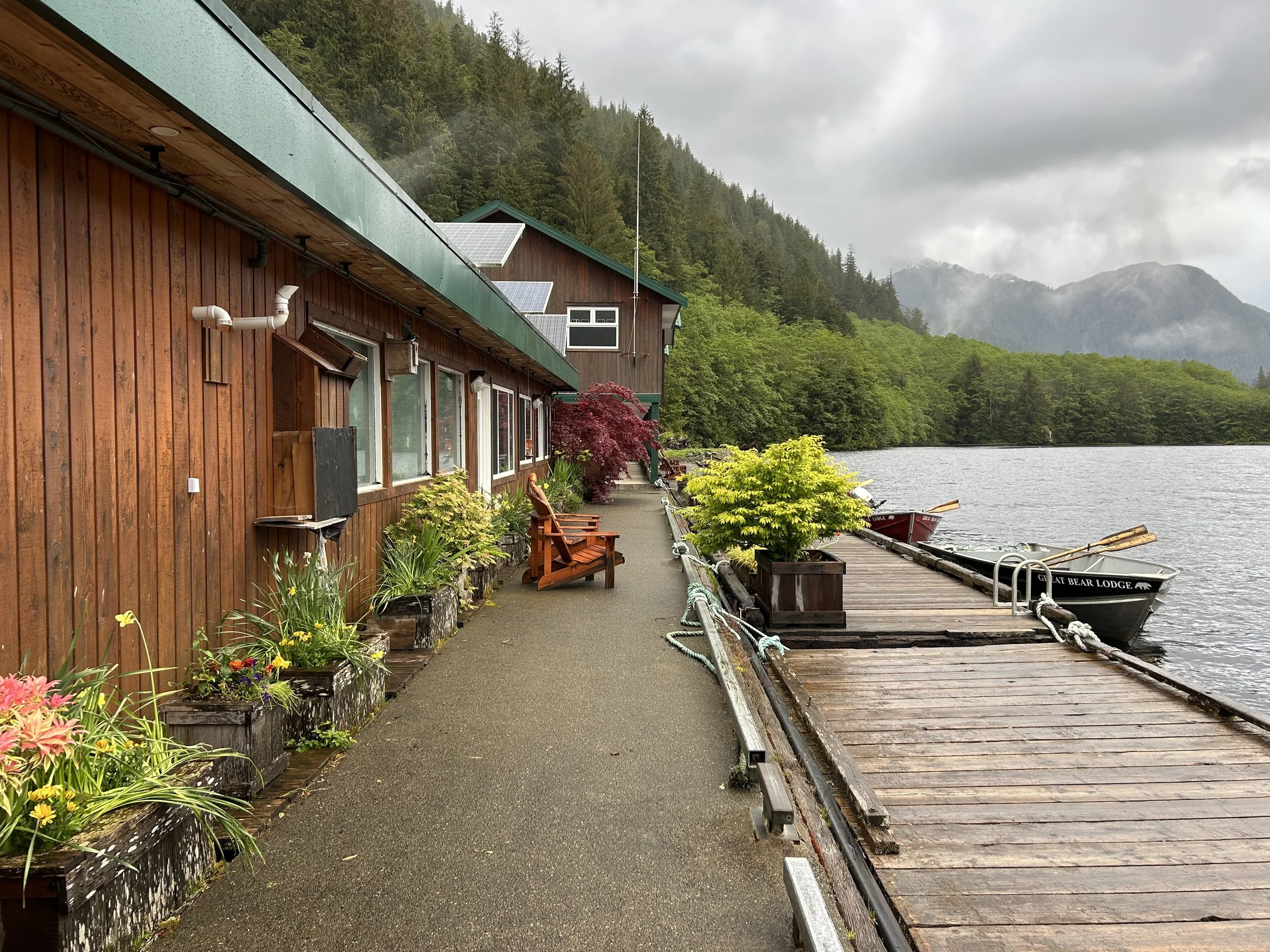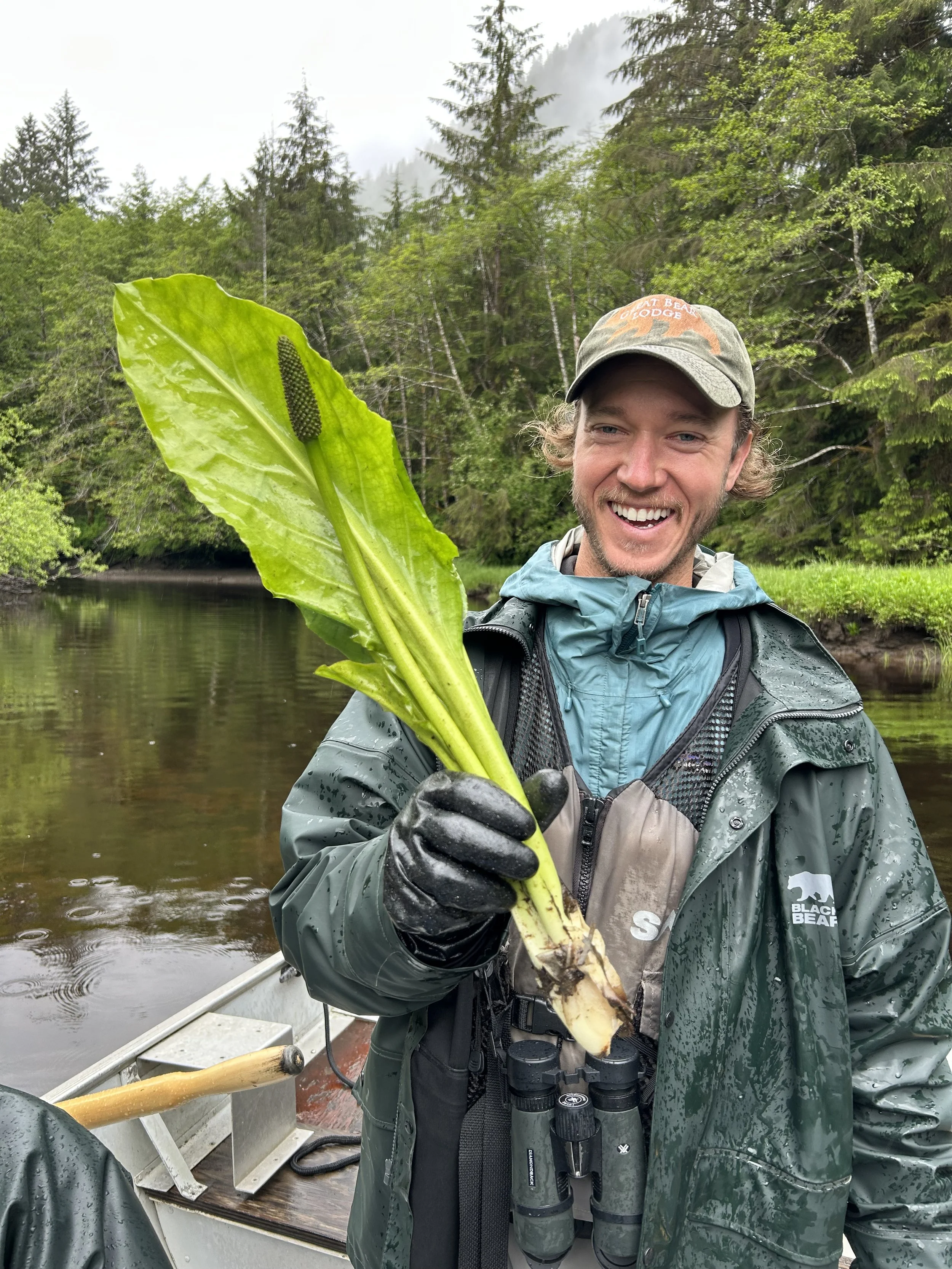
NATURE WRITING IN THE GREAT BEAR RAINFOREST
May 31 – June 4, 2026

On British Columbia’s Central coast, traditional territory of the Gwa’sala ‘Nakwaxda’xw Nations.
Writing about nature, immersed in nature
Availability:
8 SPACES AVAILABLE
Instructor: Dr. Lesley Evans Ogden
About This Workshop
Learn to bring the wonder of nature alive in words while surrounded by lush ancient forests and undulating tides of a rich estuary. This is one of the most intact habitats in the world for grizzly bears.
Your coach in this spectacular wild environment will be internationally acclaimed science journalist, author and workshop leader Lesley Evans Ogden. Lesley’s nature writing, photography and documentary work have been published and broadcast by top outlets for science and nature communication, including the New York Times, CBC, BBC, Scientific American, New Scientist, Science, National Geographic, The Atlantic, Smithsonian, Nature, and many others.
An award-winning writer and teacher, Lesley has previously led and spoken at highly regarded workshops for universities, colleges and organizations including the University of British Columbia, Simon Fraser University, Mount Allison University, the National Association of Science Writers (US), COMPASS, and the Science Writers and Communicators of Canada.
Your writing opportunities will be drawn from fresh field observations and individual passion projects. Nature Writing in the Great Bear Rain Forest will be a unique opportunity to learn from small group and individualized coaching and mentorship.
We will spend time daily in remote and beautiful Smith Inlet, using observations made in this exceptional natural environment to generate new writing. Each day at the lodge will include morning and evening wildlife tours by boat, accompanied by afternoon and evening writing sessions for coaching, focused instruction and feedback..
What’s included in your 4-day workshop experience
Daily morning and evening wildlife tours with wildlife guides and writing coach
Small group sessions that include reading and supportive feedback for works in progress
Independent writing time
Group and instructor feedback on written work in progress
Two hours of in-person individualized writing coaching from Lesley
Final reading by participants to each other and lodge staff
Session on pitching and publishing
One hour of post-workshop online mentoring with Lesley
This unique experience is an ecotour and writing workshop rolled into one, designed to be flexible to a range of participant needs and levels of experience.
At the end of this short course, you will come away with new skills and a new network — a supportive team of fellow nature writers.
Is this workshop for me?
This is an experience designed for:
· new or established writers interested in publishing science and nature writing in magazines, newspapers, blogs or a book
· museum staff wanting to improve science communication
· professors wanting to improve public engagement
· travel writers looking to expand potential markets into eco and nature writing
· hobbyists writing for the pure joy of writing
Whether you’re a hobbyist, aspiring writer, journalist, travel writer, museum curator, public information officer, blogger or scientist, you will find your days at comfortable and welcoming Great Bear Lodge thought-provoking, enlightening and inspirational. Participants will deepen their connection to nature while exploring how to share that connection with others through narrative non-fiction writing.

Dates: May 31 – June 4, 2026
Level: All Levels
Cost: $5000 CDN per participant
What does the cost include?
Two boat-based nature viewing sessions per day, including possible sightings of grizzly bears, bald eagles, seals, and whales, accompanied by lodge wildlife guides and Lesley.
Accommodation for 3 nights in a private room at the Great Bear Lodge with ensuite shower
Wilderness-gourmet meals including wine, beer and a selection of beverages
Interpretive discussion and welcome orientation for wildlife viewing
Daily group and individually-tailored nature writing instruction in the field and at the lodge to work fresh nature observations into polished prose
Individually tailored coaching and feedback
Pitching and publishing skills
Post-workshop mentorship and networking
Return seaplane flight from Port Hardy to Great Bear Lodge
Binoculars, rain gear and rubber boots, if required
Final night at the Kwa’lilas Hotel in Port Hardy (group dinner at participant expense)
Workshop tuition, including one hour follow up mentorship session online after completion
Preliminary Schedule
Day 1: Arrival by wilderness float plane late afternoon (departure from Port Hardy scheduled for 3pm), settle in, evening field trip, dinner, drinks and introductory session
Day 2: Yoga/aerobics on the dock (optional), breakfast, morning boat expedition, lunch, group writing instruction, individual writing time, dinner, evening safari, group readings of work in progress with drinks & dessert
Day 3: Yoga/aerobics on the dock (optional), breakfast, morning boat expedition, lunch, group writing instruction, individual writing time, one-on-one coaching sessions with Lesley, dinner and readings, evening expedition, individual writing time.
Day 4: Breakfast, morning expedition, pitching and publishing session, lunch, readings, wrap up, departure by float plane, dinner and wrap up at Kwa’lilas Hotel in Port Hardy.
Day 5: Travel day - depart Port Hardy for home.

Since childhood, Lesley has been captivated by the natural world and its stories. Lesley is a freelance science journalist based in Vancouver, British Columbia, Canada where she is a settler on the traditional, ancestral and unceded territory of the Sḵwx̱wú7mesh (Squamish), Stó:lō and Səl̓ílwətaʔ/Selilwitulh (Tsleil-Waututh) and xʷməθkʷəy̓əm (Musqueam) First Nations.
Lesley has a lifelong love of the natural world that spills out onto the page and screen. She writes mainly about living things but also non-living ones like dinosaurs, energy, and climate. She especially likes writing about wildlife, quirky animal behaviour, and conservation solutions that braid together Western science and Indigenous knowledge.
Prior to her journalism career, Lesley studied science, earning her BSc in Zoology at the University of Toronto followed by a Master’s in Biological Sciences at York University. Her MSc research involved scrambling through prickly undergrowth tracking hooded warblers in Pennsylvanian and Yucatan forests. For her PhD at Simon Fraser University (Burnaby, BC) she studied shorebirds, wading over mudflats and soggy farm fields during the west coast winter. During postdoctoral research at the University of British Columbia (Vancouver, BC), she hiked up mountains before sunrise to study songbirds stopping over for snacks during fall migration.
As a journalist, Lesley’s field reporting has taken her to remote salmon streams in Glacier Bay, Alaska; to humpback whale breeding sites off Hawaii’s Big Island; to sample algae and plankton from glacier-fed streams and lakes high in Albertan and British Columbian Rocky mountains; to tag rare frogs in wetlands in the Cascade range of Washington’s Olympic Peninsula; and to the high Arctic to film phalaropes breeding and spinning dizzyingly in tiny tundra ponds.
Inspired by the beauty and wonder of nature, one of Lesley’s greatest joys is sharing her skills, experience, and passion for writing with others. She has made several reporting trips to the Great Bear Rainforest of British Columbia’s beautiful Central Coast to report stories including those highlighted below, with many more stories available to peruse on her website.
About your workshop instructor, Lesley Evans Ogden
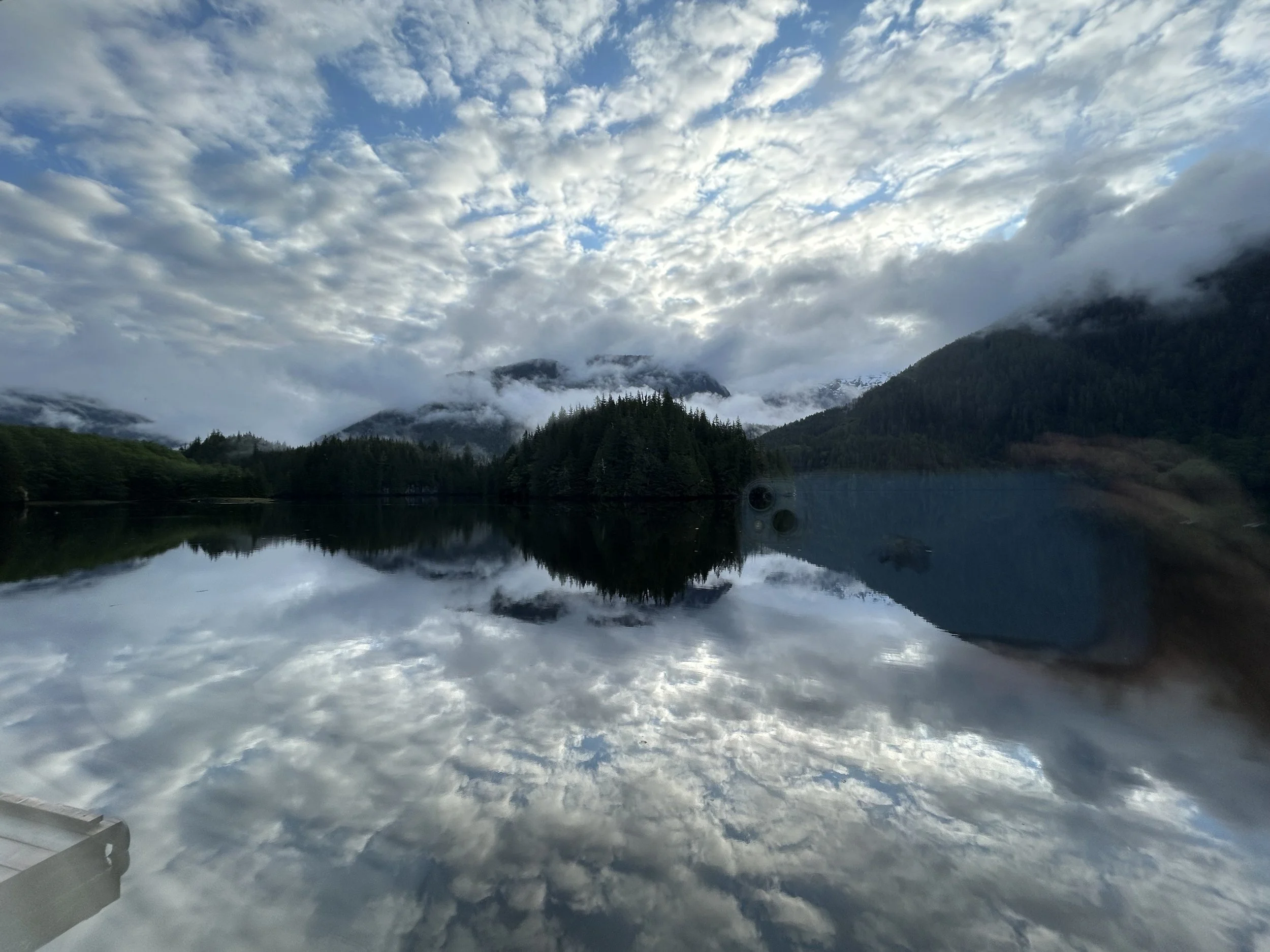
Nature writing from the instructor’s portfolio…
Stories about bears
Training Facial Recognition on Some New Furry Friends: Bears (New York Times)
In their spare time, two Silicon Valley developers aided conservationists in developing artificial intelligence to help keep track of individual bears.
Hair From Ghostly Bears Reveals New Genetic Secrets (New York Times)
First Nations peoples along British Columbia’s Central Coast led research to help preserve the area’s white-furred Spirit bears.
Rural Alaskan and Canadian communities are trying to get along with the large mammals
The surprising reason polar bears need sea ice to survive (National Geographic)
A new study investigates an important link in the predators' food chain.
Other nature stories
As Glaciers Retreat, New Streams Offer Homes for Salmon (Knowable, Smithsonian)
After the waterways form, insects move in, alders and willows spring up, and spawning fish arrive in the thousands.
How salmon can transform a landscape (BBC Future)
The fish that feed flowers. How protecting salmon in coastal Canada could have benefits that extend beyond the water they swim in and can have profound impacts on the surrounding landscape.
Eight-Legged Candy-Striper Killers Prowl Before the Sun Rises (New York Times)
A study of candy-striped spiders feasting on sleeping insects suggests there are many surprising arachnid behaviors still waiting to be discovered.
Tales of a migratory marine biologist (Nature)
Christine Gabriele’s research involves tracking the endangered humpback whale in both Hawaiian and Alaskan waters.
How Hungry Sea Otters Affect the Sex Lives of Sea Grass (New York Times)
A habit that appeared damaging at first glance seems to make oceanic ecosystems more resilient, scientists found.
Scales of Reference (bioGraphic)
Collected at the tail end of British Columbia's "silver fever," hundred-year-old salmon scales are now helping conservation scientists reconstruct and better manage the populations of one of Canada's most important fish.
